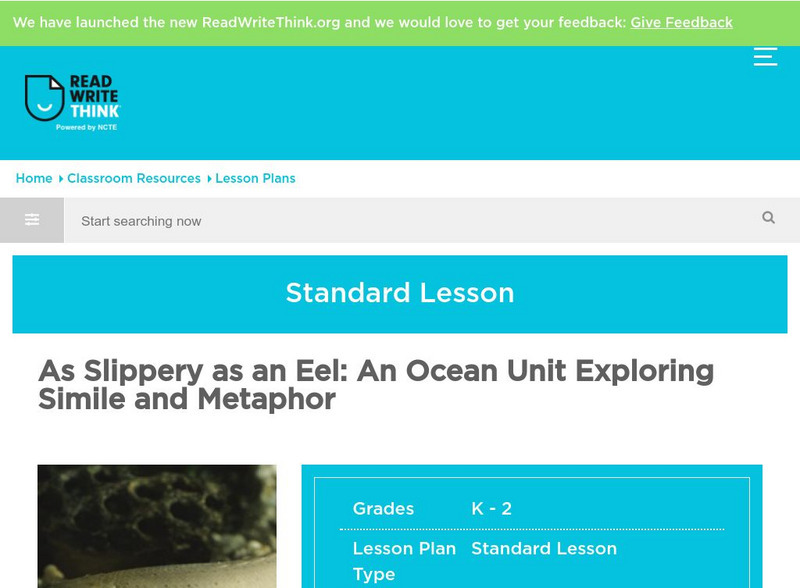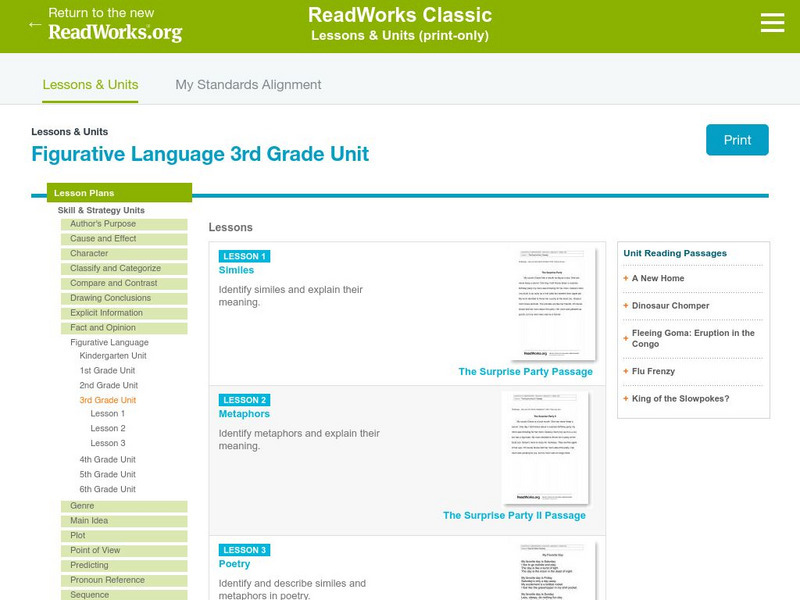Hi, what do you want to do?
Curated OER
History According to Shakespeare
Students read Shakespeare's, Julius Caesar while identifying a number of literary elements including simile, metaphor, personification, and hyperbole. As a response activity, they simulate a mock trial, and finally, compare and contrast...
Curated OER
Bluebottle
Students read the poem Bluebottle and discuss the use of the simile in the poem. In this Bluebottle poetry lesson plan, students analyze the use of verbs and the energy created by that use. Students text mark all the similes...
Curated OER
Poems for Every Season
Students read and explore autumn poetry. In this poetry lesson, students read Autumnblings and are introduced to different poetic forms. Lesson includes ideas for exploring the poetic forms presented in the book and cross-curricular...
Curated OER
Making Poetry Writing Fun!
High schoolers find a group of words from an unlikely source and turn them into a poem. They discuss the central image in two well-known poems by Langston Hughes and Emily Dickinson. They write their own short poem expressing one...
National Endowment for the Humanities
Animating Poetry: Reading Poems about the Natural World
Students complete poetry analysis activities. In this poetry analysis instructional activity, students consider the use of imagery and sound devices in poetry. Students translate poetry into another art, read a diverse selection of...
Curated OER
Putting It Together
Students read aloud the book "Courage" by Bernard Waber and discuss the examples that compromise the defintion of courage. They describe another word such as joy and work with a partner or group to brainstorm and write sentences of...
Curated OER
Author Study
Students examine and identify the characteristics of the different genres of literature. After being read and reading various stories, they identify how different books by the same author carry the same story elements. They discuss how...
Curated OER
Ode to the Earth: Magnetic Poetry
Students explore Earth Day by creating an arts and crafts project. For this nature appreciation lesson, students utilize nature related vocabulary terms on magnets and put them in different orders to create interesting poetry. Students...
Curated OER
Poetry Sings
Young scholars examine examples of literary terms in poetry. Then they choose two songs, write out the lyrics, and decipher what they think the artist is trying to say. Each student presents their song to the class and they cite examples...
Curated OER
Original Line or Familiar Find?
Students examine a primary source document from 1684 that includes many of the same lines found in Romeo's speech to Juliet from Shakespeare's Romeo and Juliet. Students compare the texts and discuss authorship during the sixteenth and...
Curated OER
Responding To Rembrandt's Work Through Poetry
Students write poetry in response to Rembrandt's landscapes and portraits. They create accompanying illustrations based on interpretations of Rembrandt's work and present them along with the poems in book format.
Curated OER
Poetry for Kids
Sixth graders be immersed indirect experiences which are opportunities for students to reflect, look back, debrief or abstract from their experiences what they have felt, and thought, and studied.
Curated OER
Octavio Paz
Tenth graders read and analyze the poem, "The Street," by Hispanic author, Octavio Paz. They research the life of Octavio Paz and identify his literary contributions. They complete an online scavenger hunt and create an author map of...
Curated OER
Fifth Grade Literature: January
Fifth graders examine and analyze various poems by Edward Hersey Richards, Robert Frost, and Emily Dickinson. They explore similes, and write journal entry responses.
Curated OER
Painless Poetry
Students choose two poems they like and share them with the class. Then they write their own poems using various forms.
Curated OER
Christmas Poetry
Learners explore writing using literary terms. In this Christmas poetry lesson, students write a poem about a Christmas tree or a snowman using at least one example of each: metaphor, simile, and personification.
Curated OER
Georgia Performance Standards Framework for ELA Unit 6-8th grade
Eighth graders explore figurative language through the study of picture books. In this figurative language lesson, 8th graders listen to books and chart the figurative language that they hear. Students discuss examples in groups.
ReadWriteThink
Read Write Think: Teaching Poetry Through Riddles
Excellent teaching resource that attempts to teach poetic concepts to middle schoolers by using riddles. Discusses riddles' use of metaphor, simile, and imagery, and relates these concepts to the learners' understanding of poetry....
Read Works
Read Works: 4th Grade Lesson: Similes and Metaphors
[Free Registration/Login Required] A lesson in which young scholars use the book Poetry for Young People: Langston Hughes edited by David Roessel and Arnold Rampersad to learn to identify and understand the use of simile and metaphor in...
ReadWriteThink
Read Write Think: An Ocean Unit Exploring Simile and Metaphor
Contains plans for four lessons that teach students about similes and metaphors using ocean themed resources. In addition to objectives and standards, this instructional plan contains links to sites used in the lessons as well as...
ReadWriteThink
Read Write Think: Figurative Language Awards Ceremony
Contains plans for five to seven lessons that teach about figurative language like similes, metaphors, and personification by asking students to write award acceptance speeches that incorporate them. In addition to objectives and...
Read Works
Read Works: Figurative Language 3rd Grade Unit
[Free Registration/Login Required] In this three-instructional activity unit, students use the book If You Hopped Like a Frog by David Schwartz and some additional short texts to learn to identify and understand the use of simile and...
Love To Know Media
Your Dictionary: Literary Terms Lesson Plan
This is a lesson plan for teaching the seven literary terms used in poetry: simile, metaphor, alliteration, imagery, hyperbole, personification, and onomatopoeia.
Read Works
Read Works: 3rd Grade Lesson: Poetry
[Free Registration/Login Required] A lesson in which students use two provided poems to learn to identify and understand the use of similes and metaphors in poetry. Lesson includes direct teaching, guided practice, and independent...




























